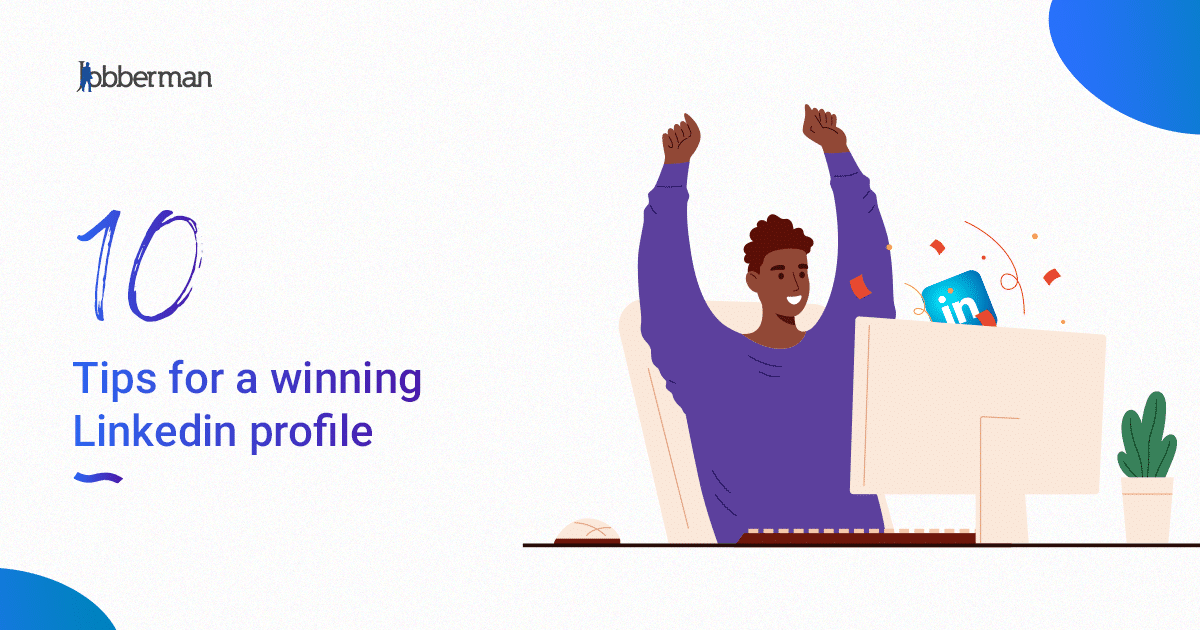
Your LinkedIn profile is your opportunity to get your name and face in front of hundreds (or even thousands) of industry experts. That’s crucial if you’re looking for a job.
However, simply having a LinkedIn page isn’t enough. You’ll need a LinkedIn profile that stands out, says the right things, and allows you to connect with people who can help you advance your career. Here are ten quick and easy ways to make your LinkedIn profile stand out:
- Choose the right profile picture for LinkedIn: A picture speaks a thousand words. It’s how others learn about you as a visual being. It sets the tone for their first impressions. You must utilize a current professional photo of yourself that accurately displays your true brand.
- Add a background photo: A background photo reveals the story of your professional life. It reveals a lot about your personality and work. It catches people’s attention, establishes the setting, and reveals a little more about what you care about. The correct background photo, more than anything, makes your page stand out, engage attention, and remain remembered.
- Create an eye-catching LinkedIn Headline: Instead of simply giving your job title, explain what you do and how it benefits your organization. Explain your role, why you do what you do, and what motivates you. Include keywords that are relevant to you and your professional path. Consider it a mini-billboard promoting you. Remember to keep your intended audience in mind. Are you talking to other industry professionals or recruiters? Write for the people you want to reach.
- Your LinkedIn summary: Your summary is a longer version of your headline and it’s your time to express your own story. Try to explain why your talents are important and how they can benefit the people you work with. Tell us more about the issue you’re trying to solve. Don’t be afraid to put in some effort, try a few different revisions, and run your summary by some friends. This is the most personal piece of content marketing you’ll ever create, and it’s well worth the time and effort. Be creative and paint a picture of who you really are as a professional.
- Customize Your Experience: It’s a good idea to customize your LinkedIn profile to the industry you work in or want to work in, as well as the role you now hold or the career path you want to pursue. Emphasize the aspects of your previous work experience that are most relevant to the jobs you want in your job descriptions. To explain not just what you did in each position, but also what you accomplished, use two to four engaging and compelling bullet points and powerful action phrases for each one.
- List your relevant skills: It’s one of LinkedIn’s quickest wins: just read through the list of skills and select the ones that relate to you. This helps to support the description in your Headline and Summary, as well as giving others a place to recommend you. The trick, though, is to stay current. A big list of abilities that aren’t vital to who you are and what you do might become cumbersome. Every now and then, do a spring cleaning of your skills list.
- Add Links and Media to Your Work Experience: You can include links, photographs, videos, and files in your “Experience” and “Featured” sections, respectively. So take advantage of this: Link to your company’s website, projects you’ve worked on, articles or reports you’ve written, or anything else that will allow recruiters to see the work you’re writing about firsthand.
- Add licenses, certifications, projects, volunteer experiences, accomplishments, and languages: There are additional sections beneath your work experience and education to highlight your history and qualifications. Do you have a second language under your belt? Have you ever won a prestigious award or written an article for a prestigious newspaper in your field? Do you have a license to practice in more than one state? Including this information in your profile is a terrific approach to show off your distinct qualities while also allowing you to include some more keywords. However, if these abilities and experiences are critical to securing your next job, you should aim to incorporate them early in your resume.
- Seek out recommendations that are strong, relevant, and recent: Recommendations help to establish your professional reputation. You can seek recommendations from people with whom you’ve worked closely, and be sure to provide talking points that assist frame the story you want your profile to tell. Your recommender should be aware of your career objectives as well as the abilities and experiences you’d like them to highlight. Also, make sure your suggestions are up to date.
- Make a Custom Profile URL: When you first create a LinkedIn profile, you’ll be given an automatically created URL, which is a clumsy string of numbers. It’s far easier to spot, understand, and share a more professional, clear, name-only URL.
Okay, you’ve made it through the list. You should now have all of the information you need to develop a stunning LinkedIn profile. All you have to do now is sit back and wait for the job offers to come in!







